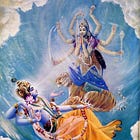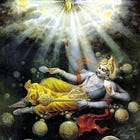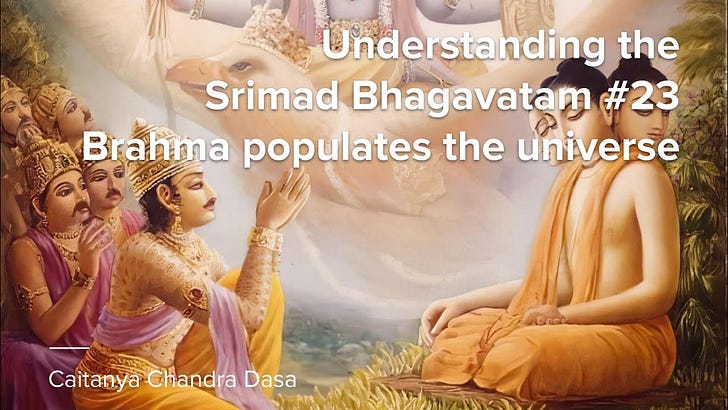How relevant is the Manu-saṃhitā for us?
Prabhupada alerted his disciples to not try to follow the Manu-saṃhitā, but at the same time mentioned in some of his purports that it would be good if, eventually, ordinary people would follow it.
The Srimad Bhagavatam describes that the work of creation of Brahma culminated in the creation of the Manus, the fathers of mankind. In the animal as well as in the demoniac species, there is little opportunity for self-realization, and even the demigods are constantly distracted by sense gratification. In the human form, there is an ideal balance between suffering and enjoyment that can propel us back to Godhead.
Apart from cultivating their own self-realization, humans also have another purpose in the universal creation, which is to perform yajñas that empower the demigods to properly administer the universe. By performing yajñas, especially the chanting of the holy names, human beings cooperate with the demigods, so they can remain powerful and capable of performing their administrative duties. When the sacrifices performed by human beings are interrupted due to attacks of demons or the spread of irreligion, the demigods become weakened, and the situation of the whole universe deteriorates. The performance of yajña is thus an important part of the universal order that brings prosperity to both human beings and demigods. As Krsna explains in the Bhagavad-Gita (3.10-12):
"In the beginning of creation, the Lord of all creatures sent forth generations of men and demigods, along with sacrifices for Viṣṇu, and blessed them by saying, “Be thou happy by this yajña [sacrifice] because its performance will bestow upon you everything desirable for living happily and achieving liberation. The demigods, being pleased by sacrifices, will also please you, and thus, by cooperation between men and demigods, prosperity will reign for all."
Proper yajnas consist of worshiping Lord Vishnu and offering the prasadam to the demigods. In the age we live it is extremely costly and dificult to perform proper Vedic yajnas, but we can achieve an even greater result by chanting the holy names congregationally. Sankirtana is recommended as the best method of sacrifice not only for Kali-yuga, but for all ages.
The main function of the Manus is to teach humanity to follow religious life and execute yajnas, performing thus our role in creation. Amongst all forms of life that exist in the universe, humans are considered the most important, because life on Earth is a kind of universal crossroads, where we can choose what will be our path in future lives. The ones who follow the devotional path, surrendering to Krsna, have the best opportunity of returning back to Godhead, while the ones who follow the pious path can take birth in the higher planets and thus continue on the path of gradual evolution. However, the ones who disregard the injunctions of the scriptures and act in sinful ways pave their way to births in the lower forms of life, as animals and plants, on the lower planets, or even in hell, entering a path from which they will take millions of lives to recover from.
The Manus transmit religious scriptures such as the Manu-saṃhitā to keep humanity on the proper path. In the Bhagavad-Gita, it is described how, millions of years ago, the knowledge of the Bhagavad-Gita had been transmitted from Krsna to Vivasvān, who in turn transmitted it to Manu, who in turn transmitted it to Iksvaku. This happened at the beginning of the reign of Vaivasvata Manu (the current Manu) and is just an example of how the Manus transmit religious scriptures to human beings, acting thus as teachers and guardians of the whole human race.
Manu also transmitted the Manu-saṃhitā, the original law book, which was rigidly followed by people in the previous eras, but now the original text is considered lost. The different available versions are all adulterated to a major or minor degree, and there are also serious problems with the translations. One who reads some of the translations available will be shocked by the barbaric punishments prescribed. These are adulterations introduced in the Middle Ages by different interpreters. What the original text says is not known.
Apart from that, there is the question of the Vaidika system in contrast with the Pañcarātrika system. The Vaidika system prescribes strict rules to prevent an enlightened society from degrading, while the Pañcarātrika system offers a flexible system destined to gradually elevate a degraded society. The Vaidika system was practiced in the previous ages, and this includes the Manu-saṃhitā, while the Pañcarātrika system and its much more flexible set of rules is current.
Prabhupada alerted his disciples to not try to follow the Manu-saṃhitā, while at the same time mentioning in some of his purports that it would be good if, eventually, ordinary people would follow it. This may sound like an apparent contradiction, but the confusion is dispelled when we consider that the Manu-saṃhitā itself emphasizes that many of the rules prescribed in the text are not for Brahmanas. In other words, the rules of the Manu-saṃhitā are applicable to a materialistic society. A spiritual society is supposed to be guided by higher values.
When we examine the question from this angle, Prabhupada's statements make perfect sense. It would be good if general society would follow the Manu-saṃhitā and thus practice the path of Vedic piety, which would bring them closer to becoming devotees of Krsna in the future. For this to happen, however, a number of issues would have to be solved:
a) One would have to somehow produce a correct and practical translation of the Manu-saṃhitā, restoring the original meaning and purport of the text. This is, however, very difficult to do, considering all editions available nowadays are adulterated to different degrees, with the original text long lost. Maybe it could be possible to produce a version combining portions of different editions, filtered through the conclusions Srila Prabhupada gives in his books. This could result in an edition that is closer to the original, but on the other hand, it is improbable that it would be largely accepted.
b) Even if a more or less authentic version becomes available, and it is somehow accepted, it would be improbable that people would agree to follow it.
c) Considering these hurdles, it would probably be easier to just convince people to directly follow Krsna Consciousness, which is, in any case, a higher form of dharma, and should, in any case, have priority.
d) Different from a mere system of rules, Krsna Consciousness has the power to directly elevate people, and as one advances in spiritual realization, good qualities automatically appear, not out of coercion, but of a higher taste.
In conclusion, devotional service to the Lord is the Supreme Dharma, and therefore, the rules and regulations of the process of devotional service supersede the laws of Manu. The main priority should thus be to teach devotees to properly follow the process of Krsna Consciousness and spread it to the general public. The moral principles prescribed in the Manu-saṃhitā could be a stepping stone in the direction of this goal, but anyone desiring to implement it would have to first produce a version of the text faithful to the original, which doesn't seem to the possible nowadays.
Read also:
If you read this article to the end, give it a like. This makes Substack recommend it to more people.






Very clear and helpful! Thank you Sir!